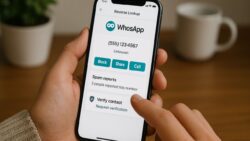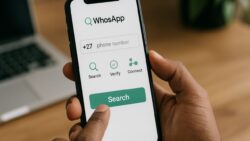WhosApp Caller Lookup – In today’s fast-paced world, receiving calls from unknown numbers has become a common experience for many South Africans. Whether it’s a missed call from an unfamiliar mobile number, a suspicious landline, or potential spam and scam calls, people are constantly looking for reliable ways to identify who is contacting them. With the rise of phone fraud and telemarketing scams, it has become increasingly important to have access to trusted number lookup tools that can protect individuals from falling victim to fraudsters. This is where WhosApp steps in as a powerful solution. Designed specifically for South African users, WhosApp allows you to trace both mobile and landline calls with ease, ensuring that you stay one step ahead of unwanted or suspicious callers. By combining user-reported insights and advanced lookup technology, WhosApp empowers users with real-time information about callers, helping them make informed decisions and avoid potential risks.

Why Caller Identification Matters in South Africa
The issue of spam and fraudulent calls is not just an inconvenience but a growing security threat. According to global reports from the Truecaller Spam Report, South Africa ranks among the top countries affected by scam calls, highlighting the urgent need for robust caller ID services. Fraudsters often use unknown numbers to trick individuals into revealing sensitive information or making financial transfers. In such cases, having access to a trusted number lookup tool like WhosApp can significantly reduce the risk of being scammed. Caller identification also plays a vital role for businesses, helping them verify legitimate customer calls and avoid wasting time on spam. By empowering both individuals and businesses to identify who is calling, WhosApp contributes to creating a safer and more reliable communication environment across the country.
How WhosApp Helps You Trace Numbers Easily
WhosApp is built to offer simplicity and effectiveness for users who need quick answers about unknown calls. By entering the mobile or landline number, users can instantly access detailed information about the caller, including whether it has been flagged as spam or reported by others in the community. This crowdsourced approach makes WhosApp unique because it combines technology with real user experiences. For example, when a telemarketer repeatedly calls multiple users, those users can report the number, making it easier for others to identify it as spam in the future. This creates a shared protection network, reducing the chances of individuals being caught off guard. In addition, WhosApp goes beyond ordinary lookup services by offering insights that are particularly tailored for the South African market, where fraudulent and unsolicited calls are on the rise. Such functionality ensures that users have reliable, locally relevant protection in their hands.
 Everything You Can Do With WhosApp: From Reverse Lookup to Spam Blocking and Contact Verifications
Everything You Can Do With WhosApp: From Reverse Lookup to Spam Blocking and Contact Verifications
Protecting Yourself From Spam and Fraudulent Calls
The dangers of spam and fraud calls should not be underestimated. Reports from organizations like the International Telecommunication Union (ITU) emphasize that telecom fraud costs billions globally each year. Fraudsters often use sophisticated techniques, including caller ID spoofing, to make their numbers look legitimate. Without tools like WhosApp, unsuspecting users may fall into traps ranging from financial fraud to identity theft. By offering real-time caller insights, WhosApp gives South Africans the ability to act before picking up unknown calls. For instance, if a number is flagged as high risk, users can avoid answering it altogether or block it permanently. Moreover, by encouraging the community to report fraudulent numbers, WhosApp continuously strengthens its database, making it harder for scammers to operate. This proactive approach ensures that users are not only protecting themselves but also contributing to safer communication for everyone.
Building a Safer Digital Communication Culture
The rise of digital communication demands that individuals remain vigilant against evolving threats. While authorities such as the FBI’s Internet Crime Complaint Center and local regulators issue warnings about fraud, tools like WhosApp provide direct, practical solutions to everyday challenges. By empowering users to trace and report suspicious numbers, WhosApp is contributing to a culture of shared safety and responsibility in South Africa. Beyond just blocking fraudsters, it allows individuals to reclaim control over their communication, reducing stress and uncertainty caused by unknown callers. As more South Africans embrace WhosApp, the tool becomes stronger, because each report helps build a more accurate and reliable database. This collective power means that users are no longer alone in the fight against spam and fraud. Instead, they are part of a growing community that values safety, transparency, and trust in digital communication.







